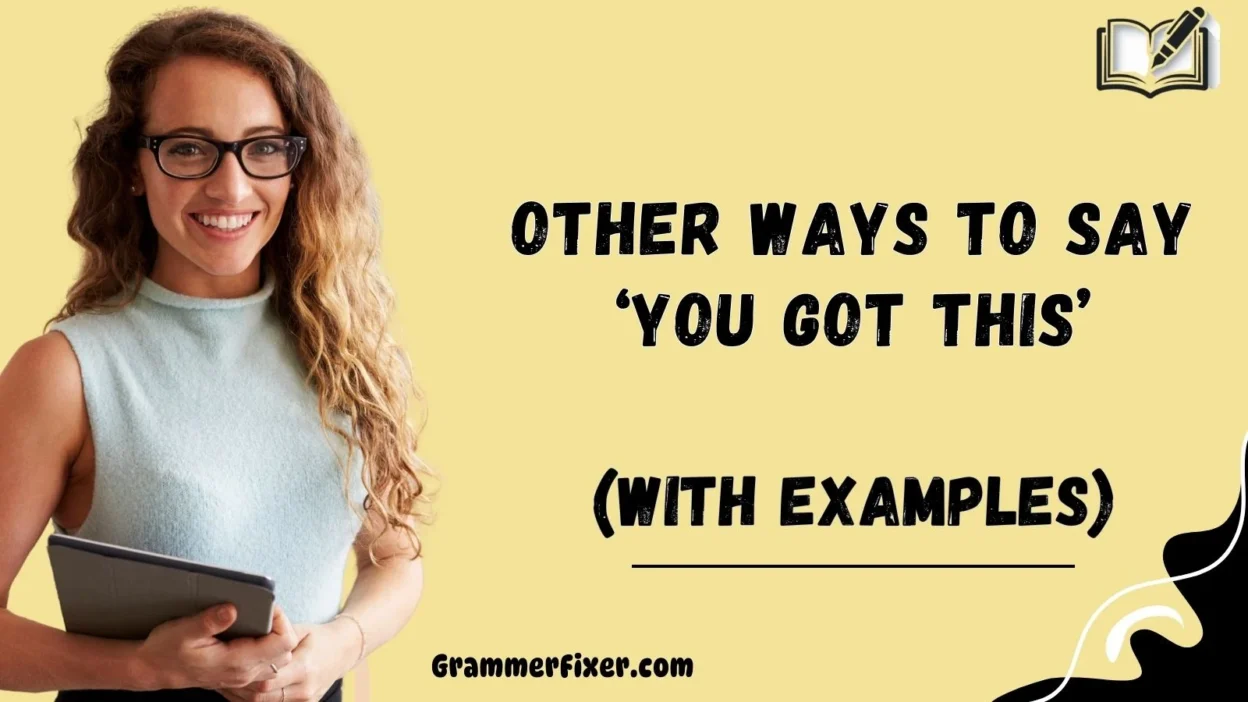Sometimes, finding the right words of encouragement makes all the difference. The phrase “You Got This” is short, uplifting, and direct—but it can also feel a bit overused. If you want to express support in a more personal, thoughtful, or creative way, this list of 30 alternatives will help you connect with your friend, colleague, or loved one on a deeper level.
Each phrase comes with its meaning, best scenarios, examples, worst uses, and tone so you can choose the one that fits perfectly.
What Does “You Got This” Mean?
The phrase “You Got This” is a simple way to reassure someone of their ability to succeed in a challenge. It conveys belief, confidence, and encouragement, often when someone is facing something difficult like a test, a presentation, or an emotional hurdle. It tells the listener: “I trust in your strength and capabilities.”
When to Use “You Got This”?
- Before exams, interviews, or big presentations
- To encourage someone facing tough decisions or emotional challenges
- In sports or competitions as a quick pep talk
- In casual friendly conversations to boost morale
- When a person feels nervous, doubtful, or under pressure
Is It Professional/Polite to Say “You Got This”?
Yes, but with caution. In a professional setting, it may come across as too casual. It works well when supporting colleagues, peers, or friendly workplace relationships, but in formal communication (with clients, superiors, or official documents), you may want to use polished alternatives such as “I believe in your abilities” or “You’re well-prepared for this.”
Pros or Cons
Pros:
- Short and sweet—easy to say in any context
- Uplifting and motivating
- Conveys confidence and reassurance
- Works well in casual and friendly conversations
Cons:
- Can feel repetitive or impersonal if overused
- May sound too casual in formal settings
- Doesn’t always express the depth of genuine support
1. You Can Do It
Meaning: A straightforward affirmation that highlights belief in someone’s abilities.
Explanation: This is one of the most classic and simple alternatives. It emphasizes capability and determination.
Scenario Example: “Don’t stress about the exam—you can do it!”
Best Use: Casual encouragement for friends, peers, or teammates.
Worst Use: In formal business communication or when someone feels deeply insecure—it might come across as too shallow or dismissive.
Tone: Supportive, simple, motivational.
2. You’ll Do Great
Meaning: A reassurance that the outcome will be positive.
Explanation: More future-focused, this phrase suggests confidence not just in their ability, but in the success of the result.
Scenario Example: “Good luck on your presentation—you’ll do great!”
Best Use: Before an interview, performance, or public event.
Worst Use: When the task involves serious stakes (like a medical procedure or high-pressure negotiation)—it may sound too casual or optimistic.
Tone: Warm, optimistic, uplifting.
3. Go For It
Meaning: Encourages someone to take a bold step or seize an opportunity.
Explanation: It emphasizes action and courage, motivating the person to start.
Scenario Example: “That new job opening sounds perfect for you. Go for it!”
Best Use: When motivating someone to take risks or pursue chances.
Worst Use: In situations where caution is necessary (e.g., financial risks, dangerous activities)—it may sound reckless or careless.
Tone: Energetic, assertive, empowering.
4. You’ve Got the Skills
Meaning: A recognition of someone’s talent and preparation.
Explanation: Rather than generic encouragement, this one acknowledges their abilities directly.
Scenario Example: “You’ve practiced for weeks—you’ve got the skills to ace this audition.”
Best Use: For professional, academic, or skill-based tasks.
Worst Use: When someone is clearly underprepared—it may come across as insincere or unrealistic.
Tone: Affirming, confident, validating.
5. I Believe in You
Meaning: A personal and heartfelt expression of trust.
Explanation: This phrase emphasizes faith in someone’s character, potential, and resilience, not just their task-related skills.
Scenario Example: “Don’t doubt yourself—I believe in you.”
Best Use: In close relationships—friends, family, or colleagues who need emotional reassurance.
Worst Use: In strictly professional or formal situations where personal sentiment may feel out of place.
Tone: Heartfelt, warm, supportive.
6. Have Faith in Your Abilities
Meaning: A reminder that the person already has what it takes.
Explanation: This phrase shifts the focus inward, encouraging self-trust and confidence in one’s own skills.
Scenario Example: “You’ve been preparing for months—have faith in your abilities.”
Best Use: Before exams, interviews, or projects where someone feels self-doubt.
Worst Use: When the person is underprepared or lacks the necessary skills—it could feel like empty reassurance.
Tone: Encouraging, reflective, empowering.
7. I’m Here If You Need Help
Meaning: Offers both support and reassurance, while leaving space for independence.
Explanation: This phrase communicates companionship and availability, showing that they don’t have to go through it alone.
Scenario Example: “You’ll do fine—I’m here if you need help along the way.”
Best Use: When someone is tackling a stressful project or emotional challenge.
Worst Use: In competitive settings where offering help might be seen as undermining their ability.
Tone: Supportive, kind, caring.
8. Good Luck
Meaning: A classic expression wishing someone success.
Explanation: It’s short, universal, and friendly, often used before big events.
Scenario Example: “Good luck on your driving test tomorrow!”
Best Use: For casual, everyday situations like exams, performances, or competitions.
Worst Use: In deeply emotional or personal struggles, where the person might expect deeper encouragement than a generic phrase.
Tone: Polite, light, positive.
9. All the Best
Meaning: A slightly more formal version of “good luck.”
Explanation: Often used in written communication, this phrase is versatile and carries a tone of sincere well-wishing.
Scenario Example: “All the best with your job interview tomorrow.”
Best Use: In emails, cards, or professional contexts.
Worst Use: When the situation calls for personal encouragement—it can feel detached or generic.
Tone: Polite, formal, supportive.
10. Break a Leg
Meaning: A traditional theater idiom meaning “good luck.”
Explanation: Though it sounds odd, it’s widely recognized as a playful way to encourage success.
Scenario Example: “You’ve practiced enough—go break a leg on stage tonight!”
Best Use: Performances, presentations, and competitions.
Worst Use: In serious or sensitive contexts (like exams, medical settings, or personal struggles)—it could cause confusion or seem inappropriate.
Tone: Playful, lighthearted, supportive.
11. Fingers Crossed
Meaning: A light-hearted wish for good fortune.
Explanation: It shows hope and optimism while keeping the tone casual and supportive.
Scenario Example: “Fingers crossed your presentation goes smoothly today.”
Best Use: When someone is waiting for results or stepping into a new challenge.
Worst Use: In very serious or high-stakes situations (like health issues or critical decisions)—it may sound too trivial.
Tone: Optimistic, casual, cheerful.
12. You Can Handle This
Meaning: A reminder of someone’s strength and ability to manage challenges.
Explanation: Emphasizes confidence in their problem-solving and resilience.
Scenario Example: “The project seems stressful, but you can handle this.”
Best Use: During stressful tasks or overwhelming responsibilities.
Worst Use: When the challenge is clearly beyond their capacity—it could feel dismissive.
Tone: Firm, reassuring, empowering.
13. Show Them What You’re Made Of
Meaning: Encourages someone to demonstrate their full potential.
Explanation: A motivational phrase that focuses on proving strength, skills, and character.
Scenario Example: “You’ve worked so hard—go out there and show them what you’re made of!”
Best Use: In competitive or performance-based situations like sports, auditions, or job interviews.
Worst Use: In sensitive, emotional struggles—it might feel like pressure rather than encouragement.
Tone: Energetic, bold, inspiring.
14. You’re Ready for This
Meaning: A confidence-boosting phrase reminding them they’re prepared and capable.
Explanation: It affirms their readiness, preparation, and resilience.
Scenario Example: “You’ve studied for weeks—you’re ready for this exam.”
Best Use: Before exams, interviews, or big opportunities.
Worst Use: When someone clearly isn’t ready—it may come across as dishonest or forced.
Tone: Supportive, confident, reassuring.
15. You’ve Got What It Takes
Meaning: Affirms that the person has the necessary qualities to succeed.
Explanation: It goes beyond skills, reinforcing their character, strength, and determination.
Scenario Example: “Don’t doubt yourself—you’ve got what it takes to succeed in this new role.”
Best Use: In moments of self-doubt, career transitions, or new challenges.
Worst Use: When someone is clearly unqualified or underprepared—it can feel unrealistic.
Tone: Empowering, motivating, affirming.
16. This Is Right Up Your Alley
Meaning: Suggests the challenge aligns with their skills, interests, or strengths.
Explanation: It reassures them that they’re well-suited and naturally capable of handling the task.
Scenario Example: “Public speaking is right up your alley—you’ll shine at the conference.”
Best Use: When the task clearly matches their experience or expertise.
Worst Use: If the person is unfamiliar with the task—it could sound sarcastic or dismissive.
Tone: Light, supportive, affirming.
17. You’re Going to Ace This
Meaning: A confident prediction of success and excellence.
Explanation: This phrase has an upbeat, casual feel, often used in academic or performance contexts.
Scenario Example: “Don’t stress about the math exam—you’re going to ace this.”
Best Use: For tests, interviews, auditions, or competitions.
Worst Use: In serious or sensitive situations (like health or emotional struggles)—it could sound tone-deaf.
Tone: Upbeat, motivating, casual.
18. Made for This Moment
Meaning: Emphasizes that their experiences and skills have prepared them perfectly.
Explanation: It adds a profound, inspiring tone, suggesting destiny or readiness.
Scenario Example: “You’ve trained hard—you were made for this moment.”
Best Use: Big events—graduations, performances, leadership opportunities.
Worst Use: Everyday or small casual tasks—it can feel overly dramatic.
Tone: Inspiring, profound, empowering.
19. Exactly Where You Need to Be
Meaning: Reassures someone they’re on the right path, at the right time.
Explanation: This phrase offers calm, grounded encouragement, affirming progress and timing.
Scenario Example: “You may feel nervous, but you’re exactly where you need to be right now.”
Best Use: During transitions, new jobs, or personal growth challenges.
Worst Use: If someone feels lost, unprepared, or out of place—it could sound invalidating.
Tone: Calming, supportive, reflective.
20. So Proud of How Far You’ve Come
Meaning: Focuses on their progress and accomplishments, not just the outcome.
Explanation: It acknowledges effort, resilience, and growth over time.
Scenario Example: “Even before tomorrow’s event, I’m so proud of how far you’ve come.”
Best Use: For friends, family, or colleagues who need recognition of their journey.
Worst Use: In strictly professional contexts—it may sound too personal or emotional.
Tone: Appreciative, warm, affirming.
21. You’re Doing Better Than You Think
Meaning: A reassurance that their self-doubt is misleading.
Explanation: Helps someone see their progress and achievements more clearly, boosting confidence.
Scenario Example: “You’re stressing over the project, but you’re doing better than you think.”
Best Use: When someone is overthinking, anxious, or undervaluing themselves.
Worst Use: In cases where serious mistakes have been made—it could sound dismissive.
Tone: Calming, reassuring, empathetic.
22. Just Focus on One Step at a Time
Meaning: Encourages breaking down big challenges into manageable pieces.
Explanation: A grounded phrase that reduces overwhelm and keeps someone present.
Scenario Example: “Don’t worry about the whole exam—just focus on one step at a time.”
Best Use: When tasks feel daunting or overwhelming.
Worst Use: In time-sensitive or urgent contexts—it may seem like slowing down when speed is needed.
Tone: Grounded, practical, supportive.
23. Remember What You’ve Already Overcome
Meaning: Reminds them of their past victories and resilience.
Explanation: Builds confidence by connecting current challenges with past successes.
Scenario Example: “You handled tougher situations before—remember what you’ve already overcome.”
Best Use: During periods of self-doubt or setbacks.
Worst Use: If the person’s past experiences were traumatic or unrelated—it might reopen wounds.
Tone: Reflective, encouraging, empowering.
24. You’re More Capable Than You Realize
Meaning: Highlights hidden strengths and underestimated abilities.
Explanation: Encourages someone to trust themselves even if they feel insecure.
Scenario Example: “Don’t underestimate yourself—you’re more capable than you realize.”
Best Use: For people who often second-guess themselves.
Worst Use: When the task truly requires skills they don’t yet have—it may feel misleading.
Tone: Empowering, uplifting, affirming.
25. This Is Your Time
Meaning: Suggests that the present moment is their opportunity to shine.
Explanation: A motivational phrase that highlights timing, readiness, and momentum.
Scenario Example: “You’ve prepared for months—this is your time to shine.”
Best Use: For performances, interviews, or milestone events.
Worst Use: In casual or small situations—it may come across as overly dramatic.
Tone: Inspiring, confident, energizing.
26. You’re Stronger Than This Challenge
Meaning: A reminder that their inner strength surpasses the obstacle.
Explanation: Emphasizes resilience, power, and the ability to rise above difficulties.
Scenario Example: “It feels tough now, but you’re stronger than this challenge.”
Best Use: During emotional struggles, setbacks, or tough decisions.
Worst Use: In lighthearted or trivial situations—it can sound overly heavy or dramatic.
Tone: Strong, empathetic, empowering.
27. You’re Unstoppable
Meaning: A bold statement of limitless ability and drive.
Explanation: Highly motivational, this phrase amplifies confidence and determination.
Scenario Example: “You’ve overcome so much already—you’re unstoppable.”
Best Use: For big goals, competitions, or moments of high motivation.
Worst Use: When the person is discouraged, exhausted, or burned out—it could sound unrealistic.
Tone: Energetic, empowering, bold.
28. You’ve Earned This
Meaning: Affirms that their hard work and preparation justify their success.
Explanation: Highlights the fairness and worthiness of their achievement or opportunity.
Scenario Example: “You worked late nights on this project—you’ve earned this moment.”
Best Use: After hard preparation, dedication, or sacrifices.
Worst Use: If success came from luck or outside factors—it might feel hollow.
Tone: Affirming, validating, appreciative.
29. Keep Going, You’re Closer Than You Think
Meaning: Encourages persistence by showing that progress is already being made.
Explanation: Combines motivation with a reminder of how far they’ve come.
Scenario Example: “Don’t quit now—keep going, you’re closer than you think.”
Best Use: When someone is on the verge of quitting or feeling discouraged.
Worst Use: In situations where the end goal is still far away—it could backfire and cause disappointment.
Tone: Encouraging, optimistic, motivational.
30. You’ll Make It Happen
Meaning: Expresses strong confidence in their ability to create success.
Explanation: This phrase blends belief in their effort, determination, and results.
Scenario Example: “With your focus and dedication, you’ll make it happen.”
Best Use: In professional, academic, or personal challenges requiring perseverance.
Worst Use: When external circumstances are beyond their control—it may sound unrealistic.
Tone: Supportive, confident, empowering.
Conclusion
The phrase “You Got This” is a powerful way to encourage and uplift someone—but relying on it too often can feel repetitive or generic. These 30 thoughtful alternatives give you a variety of ways to show care, inspire confidence, and connect on a deeper level.
- Best Use: Each phrase works when offering encouragement, reassurance, or motivation—especially before a challenge.
- Worst Use: Be mindful not to use overly casual, dramatic, or shallow phrases in serious, emotional, or professional contexts.
- Tone: The right tone depends on the relationship, setting, and emotional state of the person you’re encouraging.
By choosing the right words, you not only boost someone’s confidence but also make them feel seen, supported, and valued.



